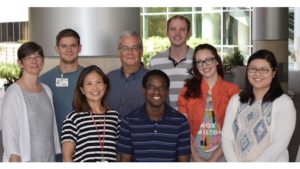Shout-out to Dr. Grover Miller, Professor of Biochemistry and Molecular Biology, for his vision, creativity and hard work in planning “the Natural State of Chemistry,” the 74th Southwest Regional Meeting of the American Chemical Society (ACS). The meeting was held in Little Rock Nov. 7-12 with a comprehensive technical program highlighting the collaborative and creative nature of chemical research in the region. Dr. Miller chaired the first regional session of the ACS Division of Chemical Toxicology.
Members of the Miller and Raney labs also presented at the meeting.
Allie Davis presented a poster entitled “Bioactivation of halogen-containing drugs as precursors to drug-induced hepatotoxicity”.
Dusty Barnette presented a poster entitled “Lamisil (terbinafine) bioactivation involves multiple cytochromes P450 based on computation and experimental approaches”.
Dakota Pouncey presented a poster entitled “Hydroxywarfarins Efficiently Reduced to Alcohols by the Human Liver Cytosol”.
Andrea Edwards presented a poster entitled “G-Quadruplex in PARP1-Mediated DNA Damage Response”.
Binyam Belachew presented a poster entitled “Function and Mechanism of Hepatitis C Virus Non-structural Protein 3 (HCV NS3) Unfolding of Viral G-quadruplex RNA Structures”.



